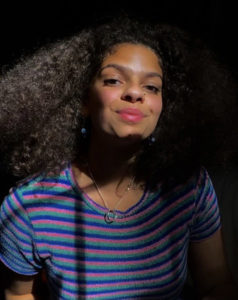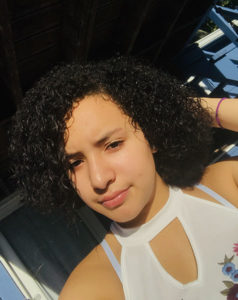Laila Ibrahim and Amy Monroy are youth researchers involved in the Youth Action Researchers at the Intersection (YARI) project. They researched the question: How do the racial/ethnic backgrounds of teachers and students affect student-teacher relationships within the classroom?
Meet the Student Researchers

Laila Ibrahim (she, her)
Birthplace: Pasadena, CA
Family members: Parents and older sister
Current favorite book: A Brief History of Time by Stephen Hawking
What’s one thing people wouldn’t know just by looking at you: I’m very uncoordinated.
How you are coping with the pandemic: I recently finished one of the first large scale pieces I’ve done in a while, a 24×36 acrylic on canvas titled “for women who eat not ladies who lunch” and have read lots of books.
Why you joined YARI: To gain more research experience. I have an interest in social sciences and hope to study sociology in college. I thought this to be the perfect opportunity to do work on a real-world scale before committing and journeying into higher education.
Improvements in education you’d want to see: We must dismantle and completely reconstruct our current education system in order to not only employ more teachers of color but also have a less Eurocentric education for students.

Amy Monroy (she, her)
Birthplace: Boston, MA
Family members: mom, dad, brother
What might people not know just by looking at you: I’m mixed race.
How you are coping with the pandemic: I’m learning to cook. I have to do online school which isn’t fun because you’re on zoom almost the whole day, and I don’t have as much motivation as I would if I was in school.
Favorite memory from the past year: My favorite memory was meeting Angel Feliz through my computer science class last year.
Why you joined YARI: There are things that need to change, and I wanted the opportunity to take action.
Improvements in education you’d want to see: We would need to make sure that teachers aren’t biased or racist to some based on their backgrounds. For students? My advice is to try and stay positive during these difficult times.

They know their research is rooted in identity and positionality. They are honest about how their gender, race and sexual orientation impact their educational success. Both were deemed "unconventional" learners and that impacted their experiences in schools. #youthvoice #yari pic.twitter.com/tQaJorC7Oj
— Students at the Center (@StudentCntrHub) December 16, 2020
Interview Responses From the Youth Researchers
Tell us a little about your research project and how the pandemic affected it.
Laila: Our research project is how racial/ethnic backgrounds of teachers impact relationships with students. We interviewed public school teachers and students in providence on their experience and how their racial background in their environments affected their overall experience.
The pandemic really affected our project. I was in Egypt at the end of February and wasn’t able to return. I got COVID and was really sick. When I got back to the US three months later, I had been disconnected for so long that it was hard to get back into it. So overall, the pandemic made it really hard to work collaboratively in a functioning and smooth way.
Amy: Laila and I were both excited to do the project. When we partnered up, we had a connection. Laila was also very interested in the topic and had the same interests. Relationships matter to us, especially in the classrooms because there are people that don’t feel that connection with a teacher.
What supports were most helpful in carrying out the project?
Laila: When I returned from Egypt, we had this meeting that clarified how we were going to proceed. We came to Rolando with scraps and we were able to come together and figure stuff out. My advisor has been really helpful, also.
Amy: I believe that the assignments helped us. Laila and I would sit down on zoom call and would work through the assignment together. Rolando would be there to answer questions and suggestions on what we could do.
Read the takeaways our adult partners had from working with youth researchers who are twice-exceptional.
What are your future aspirations? How has the YARI project influenced them?
Laila: It did! I was talking about how we completely changed my major from journalism to sociology. I believe it’s so important to understand how humans interact and the importance of our relationships to one another.
Amy: I am interested in the computer science field and engineering. YARI has influenced me because it’s helped me gain confidence when I go off to college. College worries me because I don’t know what to expect from the teachers, professors and students. Especially in the career I want to have, the positions are mostly filled by men. But I don’t want that fear to stop me from doing what I want to do.
What have you learned from this project?
Laila: I learned that I am someone that needs plans to carry out. I do better in college classes than high school because I get a syllabus. I work better with organization and planning and knowing where I am headed.
Amy: Looking back, I realize I have a passion for education. I really like talking about it. I am being raised to understand that education is important no matter what. And everyone deserves equal education. Education shouldn’t be so biased; and teachers shouldn’t be biased either.
Read more about the YARI project: goals, activities, local partners and implications.
What advice would you give adults who support learners like you?
Laila: Amy and I collectively realized that the project was a lot more so for youth than it was for adults. When we were originally planning it, we had wanted it to be about adults as well as youth. But the energy we were putting into it was from our perspectives and past experiences. So, I just think it’s important understand that everybody, no matter age, has really valuable perspectives.
Amy: Be aware that you will some students who think differently from an adult’s perspective. If you compared someone my age, it may be true that they have more experience, but the student will have a different angle. It’s important to compare perspectives. Don’t be afraid to disagree. We don’t stop learning.
Funding for this study provided by the Nellie Mae Education Foundation and the Oak Foundation.